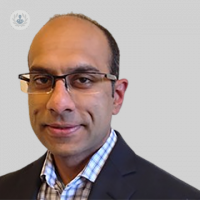Gallbladder surgery: What you need to know
Written in association with:If you’ve been experiencing persistent abdominal pain, nausea, or digestive issues, your doctor may have recommended gallbladder surgery. This common procedure is performed to address issues like gallstones or inflammation of the gallbladder, which can significantly impact your quality of life.
Experienced consultant hepato-pancreato-biliary (HPB) and general surgeon Professor Dhanwant Gomezexplores the key aspects of this surgery so you can make an informed decision about your health.

What role does the gallbladder play?
The gallbladder is a small, pear-shaped organ located beneath your liver. Its main role is to store bile, a fluid produced by the liver that helps digest fats. Although the gallbladder plays a role in digestion, it’s not essential for survival. When problems arise—such as gallstones (hardened deposits of bile), inflammation, or infection—removing the gallbladder can relieve symptoms and prevent further complications.
Why might gallbladder surgery be necessary?
Gallbladder surgery, also known as a cholecystectomy, is typically recommended for patients with gallstones or cholecystitis (inflammation of the gallbladder). Symptoms include severe abdominal pain, often in the upper right side, nausea, vomiting, and bloating after eating. In some cases, gallstones can block bile ducts, leading to serious complications like jaundice or pancreatitis. If medication or dietary changes don’t resolve these issues, surgery may be the best option.
What does the procedure involve?
Most gallbladder surgeries are performed using a minimally invasive technique called laparoscopic surgery. This involves making a few small incisions in the abdomen and using a camera and specialised instruments to remove the gallbladder. The procedure typically lasts about one to two hours, and patients often go home the same day. In rare cases, an open cholecystectomy may be necessary, requiring a larger incision and a longer recovery period.
What can you expect after surgery?
Recovery from gallbladder surgery is generally straightforward. If you’ve had laparoscopic surgery, you can expect to resume most normal activities within a week. Some patients experience mild digestive changes, such as loose stools or difficulty digesting fatty foods, but these usually improve over time as the body adjusts. Your doctor will provide guidance on diet and activity levels during the recovery period.
Are there risks associated with gallbladder surgery?
Like any surgical procedure, gallbladder surgery carries some risks, although serious complications are rare. Potential risks include infection, bleeding, or injury to surrounding organs, such as the bile ducts or intestines. Your surgeon will discuss these risks with you beforehand and ensure that the benefits of surgery outweigh the potential complications in your specific case.
How can you prepare for the surgery?
Preparing for gallbladder surgery involves following your surgeon’s instructions, which may include fasting before the procedure and stopping certain medications. It’s also a good idea to arrange for someone to drive you home and help you during the first few days of recovery. Maintaining open communication with your medical team will help ensure a smooth experience.


